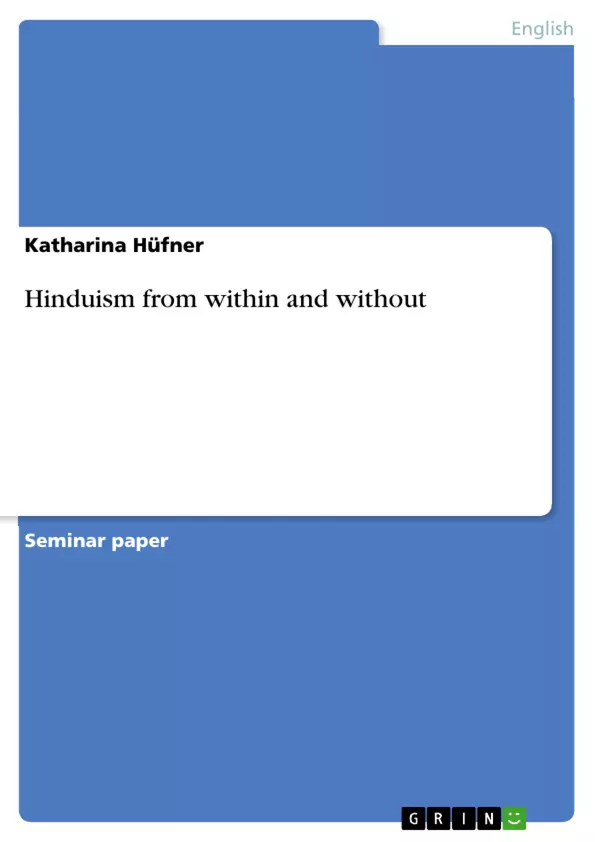To be concerned with Hinduism means to immerse oneself in a world which seems to be so different from our Western world. The question is why one has this feeling? Is it just because we combine Hinduism with the Indian subcontinent and hence a spot on earth which is so far away from us? Is the great distance the reason why Hinduism feels so exotic? Or is it rather the way Hinduism appears in comparison with other world religions? Is the religious praxis the reason for perceiving Hinduism as far out? Or is it simply the Hindu way of life which seems to be so unfamiliar? Is it the Hindu society which is so different from other ones? All these questions can be answered in several different ways. They are dependent from the perspective one looks at them and which of the themes mentioned above is going to examined more intensively.
The specific aim of this paper is to depict important aspects of Hindu religiousness and society in the same breath. There is no focus of either religion or society. These two aspects should rather be combined. This means that the paper wants to depict specific facets of Hindu belief and simultaneously raise the question what this means for the concrete life of Hindu people. If the effects of religious convictions on human life and society are examined, it will become possible to draw comparisons to our Western way of thinking. Under no circumstances will be made comparison between Christianity and Hinduism or even a two-sided social criticism. It is rather important to illustrate the different ways of thinking to show why Hinduism is so fascinating for Western Europeans and why certain convictions would not work in our society...
Inhaltsverzeichnis (Table of Contents)
- Introduction
- The belief of India's Hindu population
- A term study
- Etymological development of the term 'Hinduism'
- Definition of the term 'Hinduism'
- General features of Hinduism
- Cyclical thinking and its consequences for a Hindu
- Finding salvation
- Yoga
- Bhakti
- All good things come in fours: Four castes, four stages of life, four aims in life
- A term study
- Neo-Hinduism
Zielsetzung und Themenschwerpunkte (Objectives and Key Themes)
This paper aims to illustrate significant aspects of Hindu religiousness and society, highlighting how these aspects intertwine. It delves into the specific facets of Hindu belief while concurrently examining their impact on the lives of Hindus. By exploring the influence of religious convictions on human life and society, the paper seeks to draw comparisons with Western ways of thinking. It does not, however, engage in direct comparisons between Christianity and Hinduism or present a two-sided social critique. Instead, it emphasizes understanding the unique thought processes that contribute to the allure of Hinduism for Western Europeans, while also recognizing why certain Hindu convictions might not resonate within our society.
- The complexities of defining Hinduism and its origins in India
- The interconnectedness of religious practice, society, and personal identity within Hinduism
- The impact of cyclical thinking on the Hindu worldview and its consequences for individuals
- Exploring the concept of salvation within Hinduism through the lenses of Yoga and Bhakti
- The unique position of Hinduism among world religions, particularly its emphasis on tolerance and peacefulness
Zusammenfassung der Kapitel (Chapter Summaries)
- Introduction: This chapter introduces the topic of Hinduism and its perceived exoticism for Westerners. It establishes the paper's objectives: to explore both the religious and social aspects of Hinduism and to draw comparisons with Western perspectives. The chapter emphasizes the difficulty of presenting a comprehensive portrayal of Hinduism due to its complex and diverse nature. It highlights the paper's focus on defining the term 'Hinduism,' examining its key features, and exploring the caste system as a representation of the concrete life of Hindu people.
- The belief of India's Hindu population: This chapter delves into the term "Hinduism" itself, its origins, and its complexities. It explores the etymological development of the term, revealing its European origins and the absence of a corresponding term in the Hindu language. The chapter then examines the difficulty of defining Hinduism, comparing it to other world religions with established founders and dogmas. It highlights the lack of a universal dogma in Hinduism and its strong connection to society, leading to a diverse and constantly evolving system of belief.
Schlüsselwörter (Keywords)
The main keywords and focus topics of this text include Hinduism, Indian society, religious beliefs, social institutions, cyclical thinking, salvation, Yoga, Bhakti, caste system, cultural diversity, tolerance, and peacefulness. The text explores these keywords in relation to the unique position of Hinduism among world religions, highlighting its impact on Indian culture and its perceived differences from Western worldviews.
Frequently Asked Questions about Hinduism
What is the etymological origin of the term "Hinduism"?
The term is of European origin; there is no single corresponding term in the native Hindu languages for the diverse system of belief it describes.
What are the "Four Castes" in Hindu society?
The caste system (Varna) is a social structure that historically categorizes society into four main groups, influencing religious practice and identity.
How do Yoga and Bhakti relate to salvation?
Yoga and Bhakti are two primary paths in Hinduism to find salvation (Moksha), focusing on physical/mental discipline and emotional devotion respectively.
What is "cyclical thinking" in the Hindu worldview?
Unlike the linear time of the West, Hinduism views time and life as cyclical (Samsara), which has profound consequences for how individuals view their existence.
Why is Hinduism considered unique among world religions?
It lacks a single founder or universal dogma, operating instead as a diverse and constantly evolving system deeply interconnected with Indian society.
- Citar trabajo
- Katharina Hüfner (Autor), 2009, Hinduism from within and without, Múnich, GRIN Verlag, https://www.grin.com/document/159292



